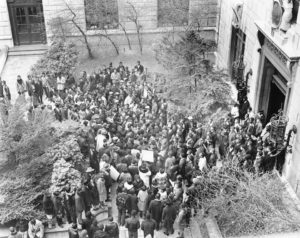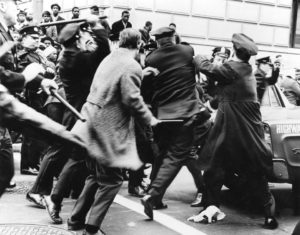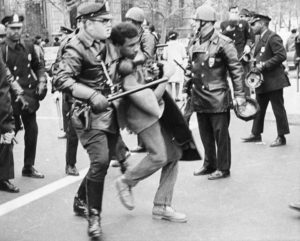Baba Mjenzi, one of the founders of my beloved elementary school, Nidhamu Sasa, was recognized during the recent 50th anniversary commemoration of the 1967 Black student walkout and protest in Philadelphia.
Baba Mjenzi was one of the adults who intervened when Frank Rizzo and his police savagely attacked peaceful middle and high school students who were exercising their right to protest and demand “dangerous” things like the right to wear African clothing to school and the inclusion of Black Studies in the curriculum.

Karen Asper Jordan, who was a child at the time, relayed the story at City Council on Thursday. When Baba Mjenzi saw Karen being dragged down the street by cops, he intervened and was brutally attacked for having the nerve to stand up for children.
Councilwoman Helen Gym and others are re-applying to have a state marker commemorating this historic event and example of student leadership, heroism, and activism. The Fellowship: Black Male Educators for Social Justice and our students will join as part of this petition.
Although I am too young to recall Mjenzi putting himself in harm’s way to protect children, I do vividly remember celebrating these older students’ heroism at the protest.

First of all, the student protest was outlined in our parent handbook, so every family in the school knew the import of the students’ bravery. Then every year we reenacted their walkout, and we honored them—just as we honored the student leaders in Birmingham, Soweto, and elsewhere.
The school calendar in our 1982-83 Parent Handbook explains our commemoration of this event:
On November 17, 1967, thousands of Black high school students and community members demonstrated in front of the Board of Education Building at 21st and the Parkway for the inclusion of more Black studies in the curriculum. This demonstration was met with the full repressive power of the Philadelphia Police Department, an action led by them Police Commissioner Frank Rizzo. Dozens of Black youth were jailed and/or hurt – some injured by Frank Rizzo himself.
We commemorate this day as one of the first attempts by Black Philadelphians to democratize the cultural and political content of the city’s public schools. We recognize the historic roots of the Black independent school movement in similar actions which took place in cities all over the country during the late ‘60s.
These moments in my schooling continue to have a deep and profound impact on me and my practice as an educator.
Unfortunately, too many educators are hypocrites. We claim we want to prepare students for the future, yet too many of us want to arrest the development of students’ preparation and ability to confront the world they live in.
We claim schools are foundations of democracy, yet we rarely prepare students to confront the oppressive forces that do not allow democracy to fully bloom.

I am grateful for the Mamas and Babas at my elementary and middle schools who embraced their roles as educators seriously and holistically. These educators believed that an education that didn’t include preparation for activism was no education at all.
Indeed, it is not. These days we hear a lot about the school-to-prison pipeline. We should definitely acknowledge and address the damage wrought by institutions founded in racism that fail to (and were never intended to) educate so many Black children. We should seek to dismantle school policies and sentencing laws that assure so many of our Black and Brown youth, boys and girls, will end up in a cell.
At Nidhamu Sasa, though, they did more than disrupt the school-to-prison pipeline. They created a school-to-activism pipeline. Because of these educators, the vast majority of their students left Nidhamu Sasa conscious, committed, and courageous.
And their legacy will continue.


[…] and activists play a role in ensuring students are on the school-to-activism pipeline. This can be done by diving into conversations that help them to connect the dots, learn from […]
[…] and activists play a role in ensuring students are on the school-to-activism pipeline. This can be done by diving into conversations that help them to connect the dots, learn from […]
[…] And Mr. Sharpton, perhaps you can use your position as a Civil Rights icon and activist to talk about how White boys are headed down the school-to-politics pipeline while Black boys are headed down the school-to-prison pipeline—and the only way to fight it is through building the school-to-activism pipeline. […]
[…] And Mr. Sharpton, perhaps you can use your position as a Civil Rights icon and activist to talk about how White boys are headed down the school-to-politics pipeline while Black boys are headed down the school-to-prison pipeline—and the only way to fight it is through building the school-to-activism pipeline. […]
[…] By now, we should all know how a lack of discipline guidance for schools influences the school-to-prison pipeline. But I want to share what might be less familiar, what my friend Sharif El-Mekki calls the school-to-activism pipeline. […]
[…] usatoday.com And Mr. Sharpton, perhaps you can use your position as a Civil Rights icon and activist to talk about how White boys are headed down the school-to-politics pipelinewhile Black boys are headed down the school-to-prison pipeline—and the only way to fight it is through building the school-to-activism pipeline. […]